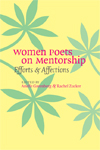
|
Although we’d like to think talent and hard work would be enough in writing poetry, the value of mentoring—especially among women poets playing catch-up with the canon—is inestimable. It’s therefore refreshing to see a book solely devoted to it, Women Poets on Mentorship, edited by Arielle Greenberg and Rachel Zucker. The subtitle, “Efforts and Affections” serves as both descriptor and warning; the book does not shy away from unfortunate extremes: some women poets are bereft of living, breathing mentors (the essay by Kirsten Kaschock) and others have blurred the lines into a sexual relationship (Cin Salach on Maureen Seaton). Many other poets claim mentorship merely by immersing themselves in another poet’s work. Between these poles are narratives of inspiration blessed by timing, place, situation, and need. Elizabeth Treadwell’s work with Paula Gunn Allen seems fortuitous since they were at the same school only briefly; Katy Lederer narrates the joys and pitfalls of being mentored by Lyn Hejinian, whose work was crusading from the margins at the time; Joy Katz finds her voice through merely reading Sharon Olds; Matthea Harvey describes an ongoing relationship with Anna Rabinowtiz that is now more friendship than mentorship. What is crucial in this book are the poems themselves, including work by a total of 45 poets. The editors have wisely chosen selections from each poet, which not only offers a brief survey of contemporary poetry by women, but also a demonstration that mentoring does not result in slavish imitation. Although both narrative in style, the work of Erika Meitner and mentor Rita Dove are distinctly different in tone. Tracy K. Smith’s work seems to pay homage to Lucie Brock-Broido’s early work, but both poets have moved on. Moving on is also a thread running through this patchwork. Many of the poets consider these encounters with older, stronger poets as “rescues,” and are not afraid to use that metaphor. No one names names, but there is an obvious sense of being mired in male-driven ruts, stuck in places where new language has not yet been forged, and where anything from a nice nudge to a full-blown life-saving operation is called mentorship. Some of this makes for squeamish reading, and the question is why? It’s difficult to be reminded of how easily we women poets are dissuaded, or how often the road ahead does not look as well traveled as it should. Why does it seem that needing a mentor is a vulnerability, especially since it’s a time-honored male tradition? And it’s discouraging to imagine that for every success story here, there are hundreds more that will not be written. But the editors and contributing poets are to be applauded for opening up in very personal ways. While the idea of creating lineages is anathema to what early feminist writers had in mind, it’s good to know that the life rafts are there. --Amy Bracken Sparks Amy Bracken Sparks is the author of serious red and queen of cups, and has had poems published in a variety of publications: American Poetry Review, DMQ Review, Denver Quarterly, Hobble Creek Review, Barn Owl Review, Southern Poetry Review, wicked alice, and others. She recently received an MFA from the NEOMFA program in northeast Ohio.
|
